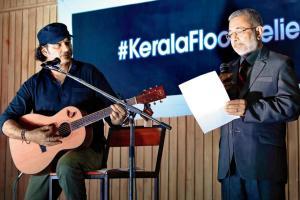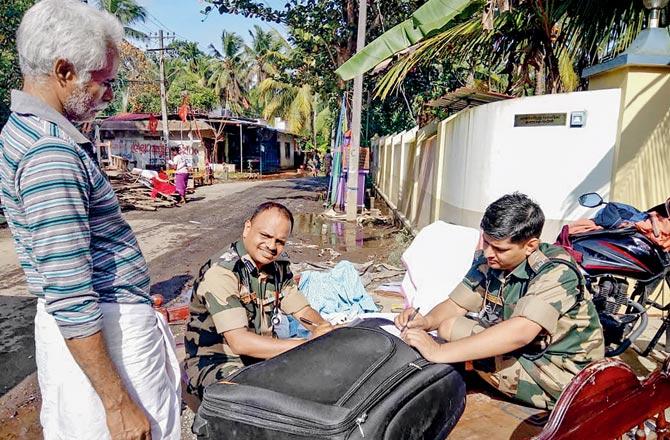Mounds of packaging from relief material could choke the drains and nullahs

Supreme Court Judge Kurian Joseph and singer Mohit Chauhan perform during an event for Kerala relief in New Delhi on Monday
Even as Kerala is attempting to limp back on its very long road to recovery, it has another huge headache on its hands: the growing mounds of plastic from the relief material pouring into the state. Environmentalists are concerned that packaging from food grains and clothes, and the humongous number of drinking water bottles may end up choking drains and creeks. On an average, the state gets more than 100 tonnes of water bottles from good Samaritans across the country and does not have plastic shredding machines or recycling plants in its villages.
Minister KK Shailaja Teacher, who holds the pollution and environment portfolio, said, "We have now deployed youth volunteers and NCC cadets to ensure that plastic waste is collected and sent to shredding machines, which we will install wherever possible."
"We must understand that this is the first time Keralites have gone through such devastation, and aid started pouring in from all over. Hence, there was no check on non-disposable plastic, as our priority was to provide support to those affected. We have sent additional volunteers to help the local municipality and zilla parishads segregate plastic and ensure that these do not choke nullahs or creeks," she added.

A BSF team assists in relief efforts. Pics/PTI
First lepto death
Teacher, who also holds the public health portfolio, confirmed the first leptospirosis death, with nine others kept under observation. "We found that the man who died had walked in flood waters, and though he had been given the Doxycycline tablet at the health camp, he had not taken it. The others who took the Doxycycline treatment are improving," she added.
At one of the camps, three to four refugees complained of dysentery and diarrhoea. "We found that contaminated food supplied at the camp was the problem," said Teacher. "We were anticipating an epidemic but, luckily, timely action by the health department and awareness measures helped us educate those affected on the dos and don'ts to curtail an outbreak. We also have additional control rooms at all districts and villages, where round-the-clock assistance is provided," the minister added.
She said, "Medicines were initially in short supply, but thankfully, due to the support of neighbours like Tamil Nadu, Andhra Pradesh, Maharashtra and others, we now have enough. People will start moving into their homes in the next few days." On aid, she said, "We are getting the required monetary help from Malayali and non-Malayali communities across the world. The Central government is still in dialogue and we are hopeful."
Mumbai aid distributed
Two patrol vessels from ICGS (Coast Guard) and a warship of the Indian Navy laden with tonnes of water, rice, biscuits, clothing, etc, were sent to Kochi from Mumbai and distributed at camps. However, nearly 30 trucks with clothing, ready-to-eat food packets, rice and water bottles were not allowed to reach the affected areas, as locals were keen to take charge of distribution. This was sorted out only when senior political party workers intervened.
Girish Nair, a member of Bassein Kerala Samajam, Vasai (W), said, "We have now stopped collecting relief material but are collecting cash, which will be sent to the Kerala CM's relief fund. We have asked our network in Kerala to prepare a project-affected-people report, especially from villages, who have lost everything in the flood. Our Bassein Kerala Samajam is in dialogue to adopt a few villages."
1,435
Number of camps
4.62 lakh
Number of inmates in camps
Catch up on all the latest Crime, National, International and Hatke news here. Also download the new mid-day Android and iOS apps to get latest updates
 Subscribe today by clicking the link and stay updated with the latest news!" Click here!
Subscribe today by clicking the link and stay updated with the latest news!" Click here!







